Is there a man alive who’s watched more rugby than veteran caller Gordon Bray?
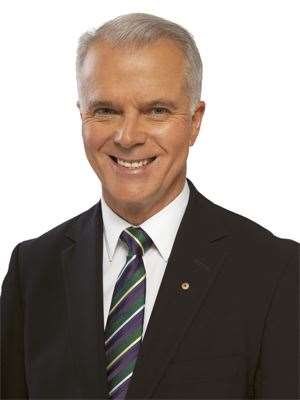 Is there a man alive who’s watched more rugby than Gordon Bray? An alumnus of Homebush Boys High in Sydney’s west, a young Bray proved a handy halfback, representing NSW Combined High Schools before entering the grade scene at Eastern Suburbs. But it’s as a commentator that he’s left his deepest mark on the game. He called his first rugby match for ABC back in 1969 and spent a further 25 years in Aunty’s bunkers before notching a 16-year stint in the Channel Seven commentary box. It was a four-decade haul that saw him cover over 400 rugby Tests, his polished tones becoming as much a part of the game’s furniture as Campo’s goose-step and the All Black haka.
Is there a man alive who’s watched more rugby than Gordon Bray? An alumnus of Homebush Boys High in Sydney’s west, a young Bray proved a handy halfback, representing NSW Combined High Schools before entering the grade scene at Eastern Suburbs. But it’s as a commentator that he’s left his deepest mark on the game. He called his first rugby match for ABC back in 1969 and spent a further 25 years in Aunty’s bunkers before notching a 16-year stint in the Channel Seven commentary box. It was a four-decade haul that saw him cover over 400 rugby Tests, his polished tones becoming as much a part of the game’s furniture as Campo’s goose-step and the All Black haka.
When Seven lost the rugby contract at the end of 2010, Bray’s time in the game looked to have finished. He turned his attention to the Sydney to Hobart telecast before heading north to call the London Olympics for 2GB. But it was unlikely rugby would let him go that easily and, earlier this year when he was on a cruise with his wife Cathy, he received an email asking if he’d be interested in heading Ten’s brand-new rugby broadcast alongside Matthew Burke and Stirling Mortlock. “I couldn’t get the reply back fast enough!” he laughs.
It’s only fitting that the man universally known as “the voice of rugby” is again back on our screens calling the 15-man game. And gee it’s good to have him back. A true rugby gentleman and a veritable sporting scholar, IS sat him down for a yarn.
With 45 years’ experience, how do you prepare for an evening in the commentary box?
I think research and homework are a huge part of being a good commentator – that’s always been my attitude. I put a lot of preparation in and I try to immerse myself in whatever commentary challenge I’m involved with. For the Lions series, I was preparing myself a few months out, doing as much reading as possible, picking up little titbits on players. I’ve always kept newspaper clippings and I love going back over my old scrapbooks. Even as a boy I kept scrapbooks of clippings – I was that kind of fanatic. So I went back to my Lions ’89 scrapbook, reading about the Battle of Ballymore and Campo’s horror in the third Test ... I also have my bio sheets – huge sheets of paper covered in all kinds of ink to highlight different points about players. All of that stuff is mainly in my head – I seldom use it during a game – but I like to have it there in case I need it. It’s all about preparation and being totally immersed in what you’re doing.
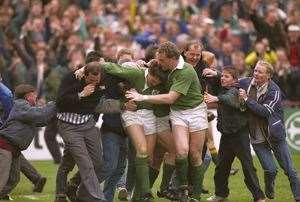 Irish flanker Gordon Hamilton sent Lansdowne Road into raptures with his late try in the ‘91 World Cup. Alas, the locals’ euphoria was not to last ...
Irish flanker Gordon Hamilton sent Lansdowne Road into raptures with his late try in the ‘91 World Cup. Alas, the locals’ euphoria was not to last ...You’ve seen a huge amount of rugby over the years – what’s your favourite moment?
It probably goes back to the 1991 World Cup quarter-final at Lansdowne Road, Australia playing Ireland. It was the moment where Gordon Hamilton scored that try to put Ireland in front with six minutes till full-time. It looked as if Australia was out of the World Cup and the ABC commentary team of myself, Gary Pierce and Chris Handy had this famous bit of airtime where we deliberately didn’t say anything for 31 seconds. Out on the pitch, 5000 people ran out and mobbed Hamilton; in the stands the cameras were all shaking because the crowd was jumping up and down. It was total euphoria – I’d never experienced anything like it. And because it was all happening before our eyes, we had this bit of non-commentary for 31 seconds. People have said to me, “That’s the best bit of commentary you’ve ever done.” And I probably have to agree. Of course, when Michael Lynagh scored to win the game, you could hear a pin drop. It was eerie ...
Your thoughts on the sacking of Wallaby coach Robbie Deans?
If I look back on the Deans era, I see good and I see bad. He blooded a lot of players – he certainly wasn’t backward about pushing those Gen Y players – and, ironically, some of those players contributed to his downfall. He also went further than previous coaches in going out to the rugby community, right across the country, preaching the Wallabies gospel. That was a big plus. But I don’t think his communication skills were his strong suit. There were always a few links missing in the chain. There were some heart-stopping wins, but I don’t think the chain ever linked up in a sequence that established consistency and security. If you ask the Australian rugby public, I think they wanted him to be successful, but I don’t think he ever quite gained their confidence or full backing. And I guess this goes back to his Kiwi heritage. That was his biggest enemy ... Frustratingly, great All Black players like Richie McCaw and Dan Carter, who Robbie coached at the Crusaders, continued to be our nemesis. And I don’t think Australian fans ever got their heads around that conundrum ... In the end, Robbie’s situation became untenable after we lost that third Test to the Lions.
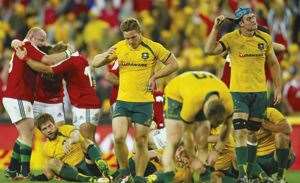 The faces of men who know they’ve missed a golden opportunity – the Wallabies despondent after the third
The faces of men who know they’ve missed a golden opportunity – the Wallabies despondent after the thirdLions Test.
That third Lions Test was a fantastic opportunity for rugby to re-establish itself in Australia’s sporting consciousness, yet the Wallabies botched it. Do you fear for the future of rugby in this country?
I could see rugby sliding if something hadn’t have been done in terms of the national coaching situation. However, I believe the appointment of Ewen McKenzie will allow the sport to hold the momentum that was gained during the Lions series. Yes, the third Test was a missed opportunity for Australian rugby, but with McKenzie coming in, we now have a guy who, to me, ranks with the elite coaches in the game. He’s a very astute psychologist. He’s an enlightened coach in that he’s always willing to adapt to the present. And I think his positive mindset’s going to rub off on his players. Because of his background – as a front rower at Randwick, a World Cup-winner under Bob Dwyer, and his years with a groundbreaking franchise like the Brumbies – he really appreciates the bigger picture as a coach. And I think that’s going to be a huge plus for Australian rugby. So to answer your question, I say no, Australian rugby can move forward very positively under Ewen McKenzie. As far as I’m concerned, a successful international sporting team flies on the intelligence and the tactical acumen of the head coach, and in that sense, Ewen’s the man for the job.
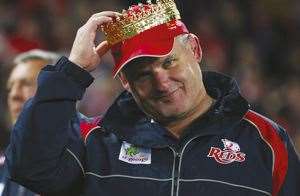 The missing “Link”? McKenzie will hold the future of Australian rugby in his hands.
The missing “Link”? McKenzie will hold the future of Australian rugby in his hands.How will McKenzie manage the “unholy trinity” of Cooper, Beale and O’Connor?
Well, there’s only one way and that’s a line in the sand. He needs to let those guys know he’ll give them his full support, but it’s a two-way street. It’s not about them, it’s about the team. Those players need to accept that, because it’s not just their livelihoods on the line, the coach’s livelihood is on the line. So it’s a one strike policy – if they let the team down, they’ve got to go. You can’t keep giving people second chances. His challenge now is to give the Genia-Cooper halves pairing a second chance and assemble a backline that’s singing from the same page. The backline needs to find that balance of risk-taking adventure and pragmatism. I think one of the problems Deans faced was that he took on the role of backline coach. I don’t think Robbie ever got his head around the Australian backline way. This team definitely needs a backline coach. And there are good people out there. Jim Mackay has done well with the Reds, Stephen Larkham has done a great job at the Brumbies, and I’d like to see Rod Kafer approached. He’s a brilliant rugby brain.
What about the scrum? Can an old prop like McKenzie fix this ongoing problem?
Well, the scrum has certainly come back to haunt us. Look at the World Cup pool match against Ireland – same problem. World Cup semi-final against New Zealand – same problem. If your scrum’s not providing a stable platform, the repercussions are calamitous, as witnessed against the Lions. I think the people who were there were the best people for the job, but clearly there are young ones coming through who’ll have to be considered. Scott Sio is someone who needs to be fast-tracked, just as the Franks brothers were for New Zealand. James Slipper should come into contention, and Greg Holmes has got a lot fitter and made more of an impact around the park, so he too should come into contention ... You’ve got to remember, too, that scrummaging is moving into a new dimension with the crouch-bind-set call. This is going to add a whole new dynamic: the massive impact of the engagement will be lessened and the scrum will become more
of a wrestle. Hopefully that’s an area we can work to our advantage.
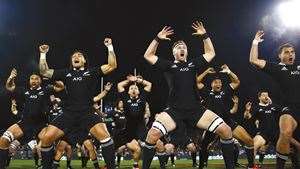 The benchmark: Australia’s record against these men will define McKenzie’s tenure as Wallabies coach.
The benchmark: Australia’s record against these men will define McKenzie’s tenure as Wallabies coach.As a qualified referee, what’s the greatest problem with rugby’s laws right now?
I believe the main problem lies in the separation of the attacking and the defensive lines. Too many games are dominated by the defences; there are too few opportunities for the backs. I think assistant referees have to be far more diligent in policing that off-side where defenders are getting a head start and getting up in the faces of the backline before they can build a head of steam. We need to maintain that point of separation so the backs get an opportunity to do their stuff. In rugby league they’ve got far more space and time and, ideally, that’s the scenario we need in rugby union.
This year we’ve got Super 15, the Lions Tests, more Super 15, The Rugby Championship, a spring tour ... Is the rugby season too long and too diffuse?
Well, clearly rugby is trying to compete with the other codes for exposure and viewers. But you’ve got to say it hasn’t worked, and that’s been shown by the disjointed play we saw in the Super 15 after the Tests against the Lions ... Still, I think Channel Ten has done a terrific job marketing the Wallabies on free-to-air. I think they’ve been very brave taking these Tests to every capital city live. That’s something that hasn’t happened since the ABC televised rugby back at the ’91 World Cup and it’s something that’s brought people who haven’t been watching rugby back to the game.
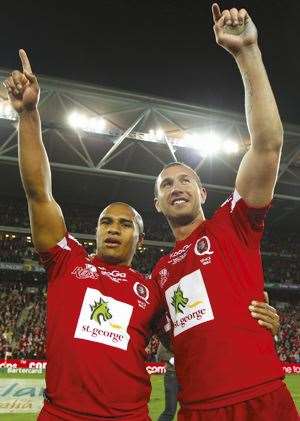 Revitalising the Genia-Cooper halves pairing will be McKenzie’s first point of order as coach.
Revitalising the Genia-Cooper halves pairing will be McKenzie’s first point of order as coach.Both our World Cup-winning teams of ’91 and ’99 were products of the amateur era. Has Australian rugby struggled to adapt to professionalism?
I think a lot of it comes down to leadership at the very top, the administration of the ARU. I don’t think they’ve had the vision or the programs to seek out new talent that’s capable of going all the way. I don’t think our pathways to the top have been consistent. Looking at the academy structure and the gap between club rugby and Super 15 rugby, I don’t think we’ve got that right ... I also don’t think we’ve had the right coach at the Wallabies. Alan Jones, Bob Dwyer and Rod Macqueen were outstanding coaches with brilliant support staffs. But since 2002, when we last won the Bledisloe Cup, I don’t think we’ve had that absolute world-class coach; someone who can take on the world and beat the world. In Ewen McKenzie, I do think we’ve now got a coach in place who can do that.
So you can see the Wallabies recapturing that dominance we enjoyed over the Kiwis under Rod Macqueen?
Whether we can get that level of dominance is another thing, but, yes, of course I can see us regaining the Bledisloe Cup. Ewen’s a very positive guy and he has a terrific record against New Zealand teams at the Super 15 level. I’m sure with him at the helm, Australia can get it right and win back the Bledisloe Cup. It’s going to happen, I’m quite sure of that. I can see signs we’re moving in the right direction. Don’t forget, our Australian Schoolboys team beat New Zealand last year ...
− Aaron Scott
Related Articles
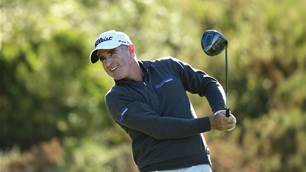
Video interview: Drinks With ... Matt Millar
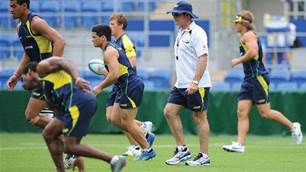
Michael O'Connor still an asset to Aussie 7s squads
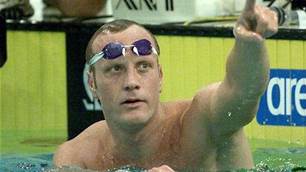

.png&h=115&w=225&c=1&s=1)










